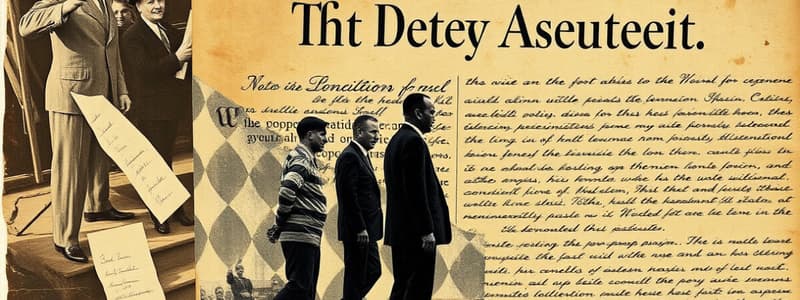Podcast
Questions and Answers
What does the 24th Amendment prohibit?
What does the 24th Amendment prohibit?
- Censorship of votes
- Requiring a poll tax for voting (correct)
- Mandatory voting for all citizens
- Voting age restrictions
What is the primary purpose of the 24th Amendment?
What is the primary purpose of the 24th Amendment?
To prohibit poll taxes in federal elections.
The 24th Amendment allows states to charge a poll tax for voting in federal elections.
The 24th Amendment allows states to charge a poll tax for voting in federal elections.
False (B)
What power does Congress have regarding the 24th Amendment?
What power does Congress have regarding the 24th Amendment?
What was a consequence of the poll tax for the black population?
What was a consequence of the poll tax for the black population?
What is a poll tax?
What is a poll tax?
What did different kinds of poll taxes do?
What did different kinds of poll taxes do?
In what year did Congress begin attempting to abolish the poll tax?
In what year did Congress begin attempting to abolish the poll tax?
What was often a requirement for suffrage in colonial times?
What was often a requirement for suffrage in colonial times?
On what date was the 24th Amendment ratified?
On what date was the 24th Amendment ratified?
When was the 24th Amendment proposed?
When was the 24th Amendment proposed?
Flashcards are hidden until you start studying
Study Notes
24th Amendment Overview
- Prohibits states from requiring a poll tax for federal elections, enhancing voter accessibility.
- Ratified on January 23, 1964, after being proposed on August 27, 1962.
Poll Tax and Its Impact
- Poll taxes served as obstacles to voting, disproportionately affecting lower-income citizens, particularly the black population.
- Methods employed to minimize black voter participation included accumulating back-taxes, leading to significant financial burdens for potential voters.
- The tax structure favored affluent white citizens, allowing easier access to voting compared to poorer black citizens.
Congress and Enforcement
- Congress possesses the authority to legislate the enforcement of the 24th Amendment.
- Despite ratification, only a few states maintained poll tax laws, highlighting the challenge in completely abolishing the tax through mere legislation.
Historical Context
- The practice of poll taxes has deep roots, originating in European tax systems.
- Historical fight for suffrage included land ownership qualifications prior to the widespread removal of such barriers.
Supreme Court Considerations
- The Supreme Court's preceding rulings created doubt about whether laws alone could eliminate the poll tax, as only five states still upheld the practice by the time the amendment was ratified.
Studying That Suits You
Use AI to generate personalized quizzes and flashcards to suit your learning preferences.




